|
|
The Holy Prophet Zephaniah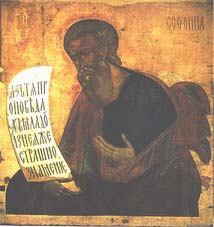 Born on the mountain of Savarat and of the tribe of Simeon, he lived and prophesied in the seventh century before Christ, in the time of Josiah the pious King of Judah, and was a contemporary of the Prophet Jeremiah. With his great humility, pure mind and constant striving after God, he was found worthy of seeing into the future. He foretold the day of the wrath of God and the punishment of Gaza, Ashkalon, Ashdod, Ekron, Nineveh, Jerusalem and Egypt. He looked upon Jerusalem as"a filthy, polluted and oppressing city ... her princes within her are like roaring lions; her judges are evening wolves ... her prophets are light and treacherous persons; her priests have polluted the sanctuary, they have done violence to the Law (Zeph. 3:1-4).Foreseeing the coming of the Messiah, he cried out with rapture: "Sing, O daughter of Sion; shout, O Israel; be glad and rejoice with all thy heart, O daughter of Jerusalem!" (3:14). This seer of secrets and mysteries went to his rest in the place where he was born, there to await the general Resurrection and his reward from God. Born on the mountain of Savarat and of the tribe of Simeon, he lived and prophesied in the seventh century before Christ, in the time of Josiah the pious King of Judah, and was a contemporary of the Prophet Jeremiah. With his great humility, pure mind and constant striving after God, he was found worthy of seeing into the future. He foretold the day of the wrath of God and the punishment of Gaza, Ashkalon, Ashdod, Ekron, Nineveh, Jerusalem and Egypt. He looked upon Jerusalem as"a filthy, polluted and oppressing city ... her princes within her are like roaring lions; her judges are evening wolves ... her prophets are light and treacherous persons; her priests have polluted the sanctuary, they have done violence to the Law (Zeph. 3:1-4).Foreseeing the coming of the Messiah, he cried out with rapture: "Sing, O daughter of Sion; shout, O Israel; be glad and rejoice with all thy heart, O daughter of Jerusalem!" (3:14). This seer of secrets and mysteries went to his rest in the place where he was born, there to await the general Resurrection and his reward from God.St John the Silent (the Hesychast)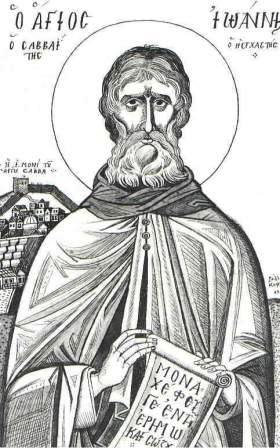 Born in Nicopolis in Armenia, he was the son of Encratius and Euphemia. He became a monk at the age of eighteen and gave himself to asceticism, thoroughly cleansing his heart with tears, prayer and fasting. After ten years, he was made Bishop of Colonia. The example of his life drew his brother, Pergamius, and his uncle, Theodore, both noted members of the court of the Emperors Zeno and Justinian, to lead lives pleasing to God. Seeing the evil and intrigues of the world and his inability to put matters right, he abandoned the episcopal throne and went to the monastery of St Sava near Jerusalem, disguised as a simple monk. He remained there a number of years quite unknown, conscientiously and capably performing whatever service the abbot gave him. Thereupon St Sava suggested to the Patriarch that he be ordained priest. When the Patriarch came to do this, John confessed that he already bore the rank of bishop. Then St John shut himself into his cell and spent year after year in silence and prayer. Afterwards, he spent nine years in the desert, sustaining himself with wild herbs, and then he returned to the monastery. He wrested the faithful away from the heresy of Origen, and made a great contribution to the struggle against that heresy and its condemnation. He was able to perceive the spiritual realm with clarity, and heal the sick. He could easily subdue demons, having already conquered himself. He entered peacefully into rest in 558 at the age of a hundred and four, being great in humility, power and godly wisdom. Born in Nicopolis in Armenia, he was the son of Encratius and Euphemia. He became a monk at the age of eighteen and gave himself to asceticism, thoroughly cleansing his heart with tears, prayer and fasting. After ten years, he was made Bishop of Colonia. The example of his life drew his brother, Pergamius, and his uncle, Theodore, both noted members of the court of the Emperors Zeno and Justinian, to lead lives pleasing to God. Seeing the evil and intrigues of the world and his inability to put matters right, he abandoned the episcopal throne and went to the monastery of St Sava near Jerusalem, disguised as a simple monk. He remained there a number of years quite unknown, conscientiously and capably performing whatever service the abbot gave him. Thereupon St Sava suggested to the Patriarch that he be ordained priest. When the Patriarch came to do this, John confessed that he already bore the rank of bishop. Then St John shut himself into his cell and spent year after year in silence and prayer. Afterwards, he spent nine years in the desert, sustaining himself with wild herbs, and then he returned to the monastery. He wrested the faithful away from the heresy of Origen, and made a great contribution to the struggle against that heresy and its condemnation. He was able to perceive the spiritual realm with clarity, and heal the sick. He could easily subdue demons, having already conquered himself. He entered peacefully into rest in 558 at the age of a hundred and four, being great in humility, power and godly wisdom.The Hieromartyr Theodore, Archbishop of Alexandria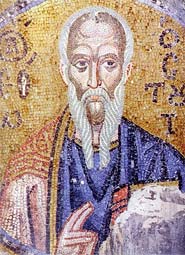 After serving as Patriarch for two years, he was tortured by the pagans. They put a crown of thorns on his head, and finally beheaded him for the Faith in 606. After serving as Patriarch for two years, he was tortured by the pagans. They put a crown of thorns on his head, and finally beheaded him for the Faith in 606.Our Holy Father Theodulus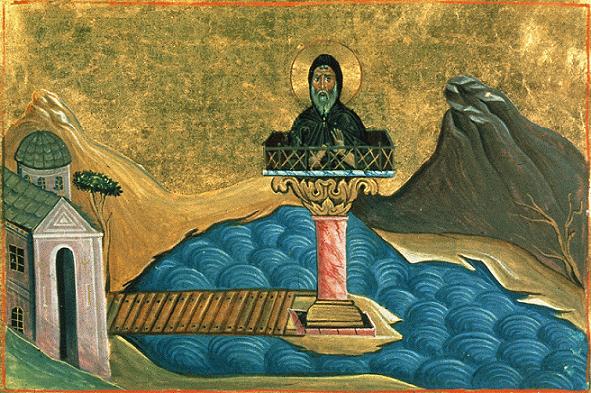 A noted patrician at the court of Theodosius the Great, he abandoned the vanity of this world after the death of his wife, and left Constantinople for a pillar near Ephesus, on which he spent a good thirty years in asceticism. A noted patrician at the court of Theodosius the Great, he abandoned the vanity of this world after the death of his wife, and left Constantinople for a pillar near Ephesus, on which he spent a good thirty years in asceticism.Our Holy Father Sava of Storozhev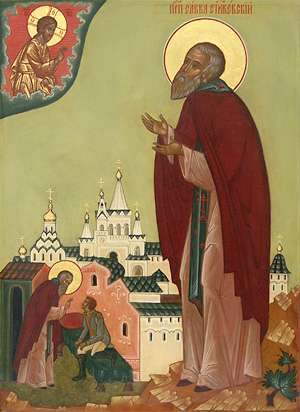 He was a disciple of St Sergius of Radonezh and a great wonderworker. After his death, he appeared to many people, sometimes to instruct, sometimes to warm and sometimes to heal. He went from this life to the better one in 1406. He was a disciple of St Sergius of Radonezh and a great wonderworker. After his death, he appeared to many people, sometimes to instruct, sometimes to warm and sometimes to heal. He went from this life to the better one in 1406. |